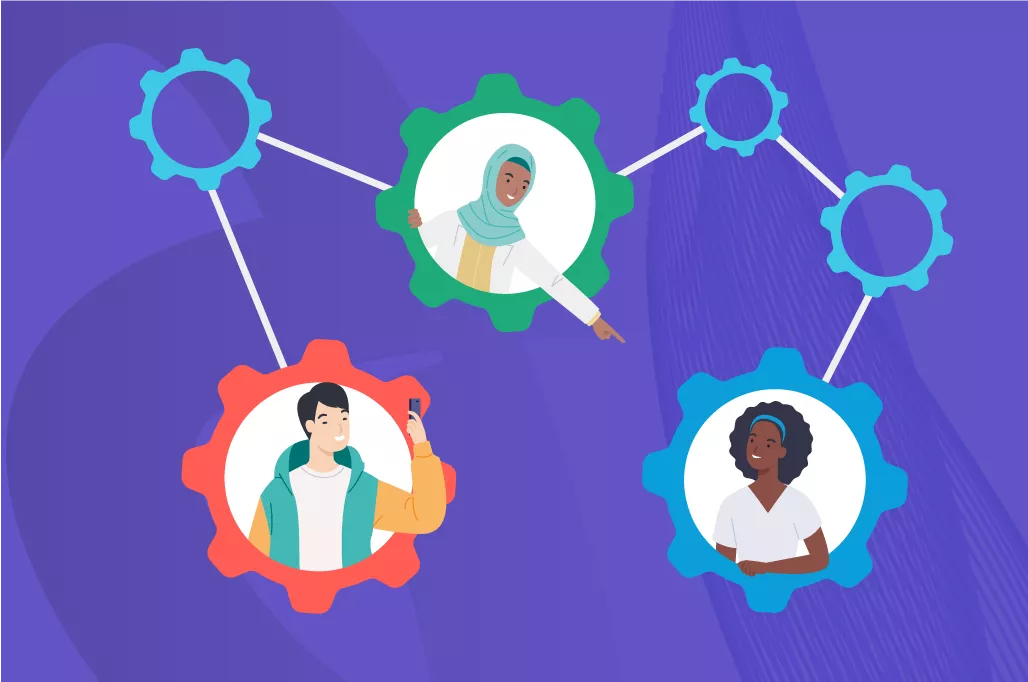Through the challenges of the last 10 months, HR teams have arguably never faced this much pressure. Back in February, more than half of HR professionals were already reporting that their organisations were hiring fewer people. They were also spending less on contract workers and redirecting spending to support their existing teams. That means developing your current skill sets and arming yourself with the tools to adapt to change have never been more important.
Along with that ability to adapt, you’ll end up with a more well-rounded work experience that includes professional (and personal) development. That means you’ll be happier and more engaged at work, and you’ll see that impact the experience of your customers, too. Read on to find out how upskilling can not only benefit your bottom line, but also help you be prepared for the future, and shape the way it looks.
Preparing for change
Helping people navigate change is one of the biggest challenges HR professionals face. Whether there’s a pandemic or not, it’s the HR team’s responsibility to maintain morale, help people stay on track and remain focused on upskilling both their own teams and other employees to meet new needs.
A really great habit to build is constant communication before, during and after big changes. The second most important things to build are the skills your people will need to cope with change. This will make them feel more secure and prepared, and they will hopefully start to embrace the changes that come their way.
Providing learning opportunities not only prepares your HR teams and your entire organisation for change, but it also will keep your employees engaged and fulfilled. This will likely lead to a longer tenure with your business, helping you make the most of your highly skilled employees and stay competitive.
But, the learning content you’re providing them with has to be right. It has to be relevant to their work, and has to be flexible. This can be a challenge for HR teams, but it’s not a difficult one to overcome. Choose learning that’s flexible, accessible and offered in an engaging way that encourages your people to continuously learn. More on that later.
Shifting behaviours and mindsets
The concept of agility and learning to adapt to change is on every organisation’s radar right now. There’s a reason for that. Things will always be shifting and changing, and your HR team needs to approach everything they do with that in mind.
HR leaders need to learn from past recessions and challenges, and focus on the fact that businesses who have agility woven into everything they do come out stronger on the other side. Those leaders need to prepare themselves and their teams for all kinds of outcomes. That could be really fast growth, or no growth at all, or complete restructures – whatever the scenario, if you’re ready for anything, you’ll find success.
You can ready yourself for these outcomes by preparing contingency plans, and working with the people you have. Collecting HR data on your current teams can help you understand what skill sets your current workforce has that you might not be making the most of, and what skills both you and they might want to develop that could be really useful for your organisation.
Using those HR insights, combined with a cultural shift within your entire organisation to understand that change doesn’t have to be scary, will help you and your teams roll with the punches, and find success.
Improving the employee experience
Another big challenge for HR teams is supporting a new kind of office culture. When most of us shifted to working from home in early 2020, that left people teams to navigate supporting that kind of work, or supporting a blended office environment. Now more than ever, employees need to know that they are supported, and if you aren’t able to do that, the risk of losing your workforce to organisations that are more flexible could become more real.
Whether you’re working with a fully-remote team or in a more hybrid environment, you should work on taking your company’s pre-pandemic culture and shifting those qualities into your current day-to-day. This is a people-first approach, and you can use those HR insights we mentioned above to help inform your decisions. Employee engagement surveys can also be useful here.
All of these insights and data will help you and your HR team better understand what employees need, from personal pain points to roadblocks in their daily tasks. If your HR team doesn’t understand how to collect and use this kind of data, it might be time to start developing your skills in that area. The benefits of that are two-fold. Again, your HR employees’ skill sets will become more useful to both them and you, and the knowledge they’ll gather will trickle down to other teams, benefiting your entire organisations.
Why investing in your employees is good for the bottom line
As we’ve said above, investing in your own and your employees’ professional development has a direct impact on your business success. That’s extra important for an HR team, because their ability to do their jobs well impacts the wellbeing of every other person in your business. Below are the three key things that happen when you help your employees upskill:
- Morale is boosted. When you give your workforce the opportunity to learn and grow within their roles, they’ll be happier. When they’re happy working for you, they’ll see a brighter future for themselves within your organisation and want to stick around longer. Reskilling and upskilling can give employees a greater sense of purpose, too, and make them more eager to keep on learning.
- Customers are happier. Again, a happy workforce equals happy customers. When your people believe in the work they’re doing and the organisation they’re doing it for, that will shine through when they interact with customers, and prospective clients. As well, your customers will be more willing to work with a business that’s clearly full of knowledgeable, eager people.
- Simpler recruitment. This one is for your HR teams. When you have a successful organisation, you won’t have trouble finding the best talent who wants to be a part of that success. Your HR team will have an easier time finding the right people to fill gaps in all your teams, and they’ll be able to focus on navigating change, and their own growth.
About Avado
For more than 20 years, Avado have been providing professional training and qualifications that transform businesses. Check out all of our CIPD courses to find the one that’s right for you.
 6 min read
6 min read 




